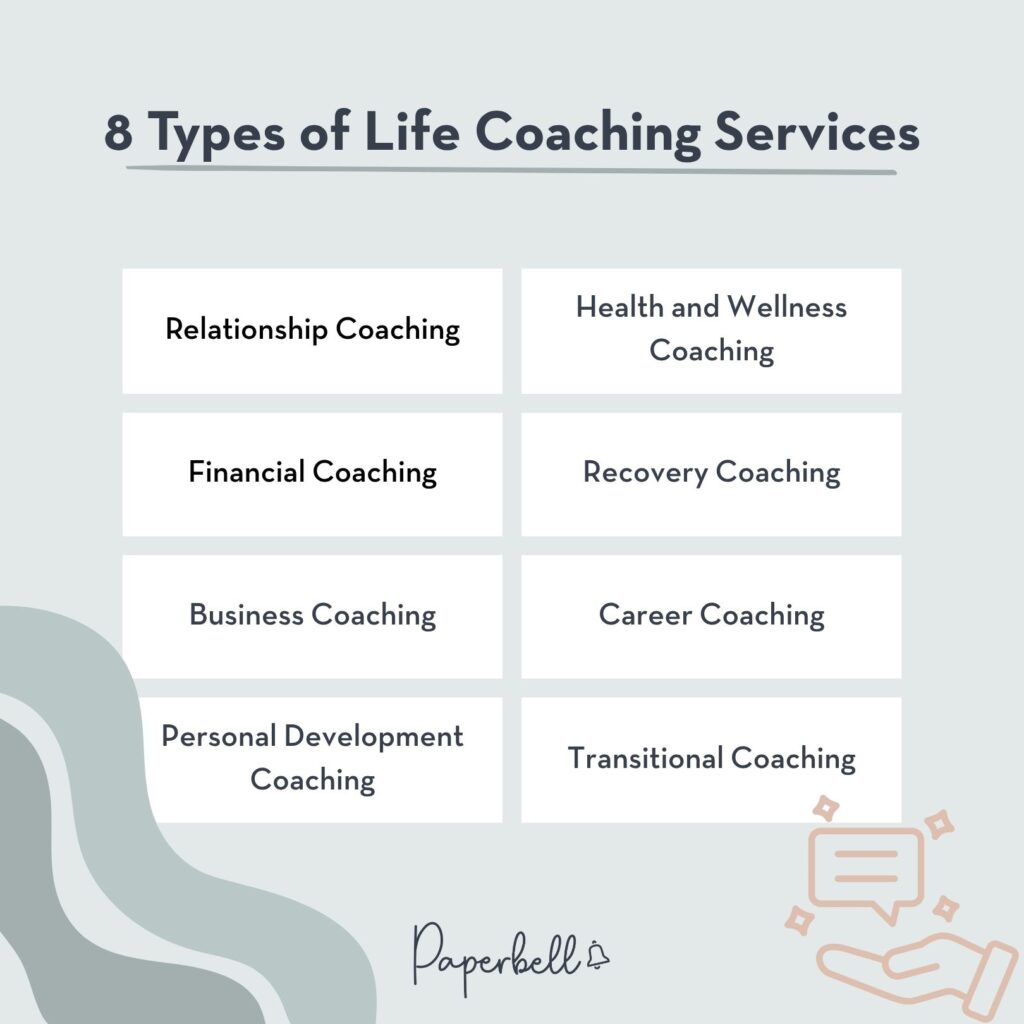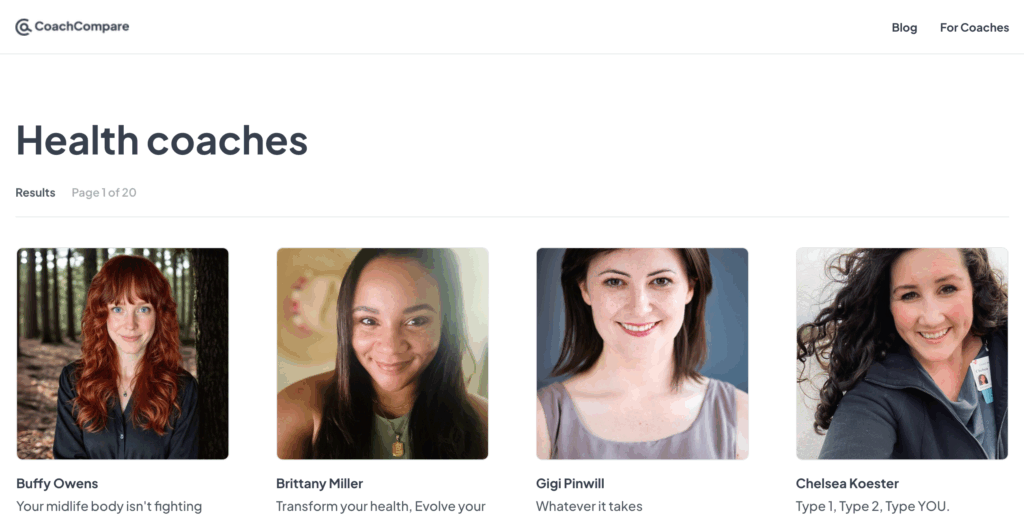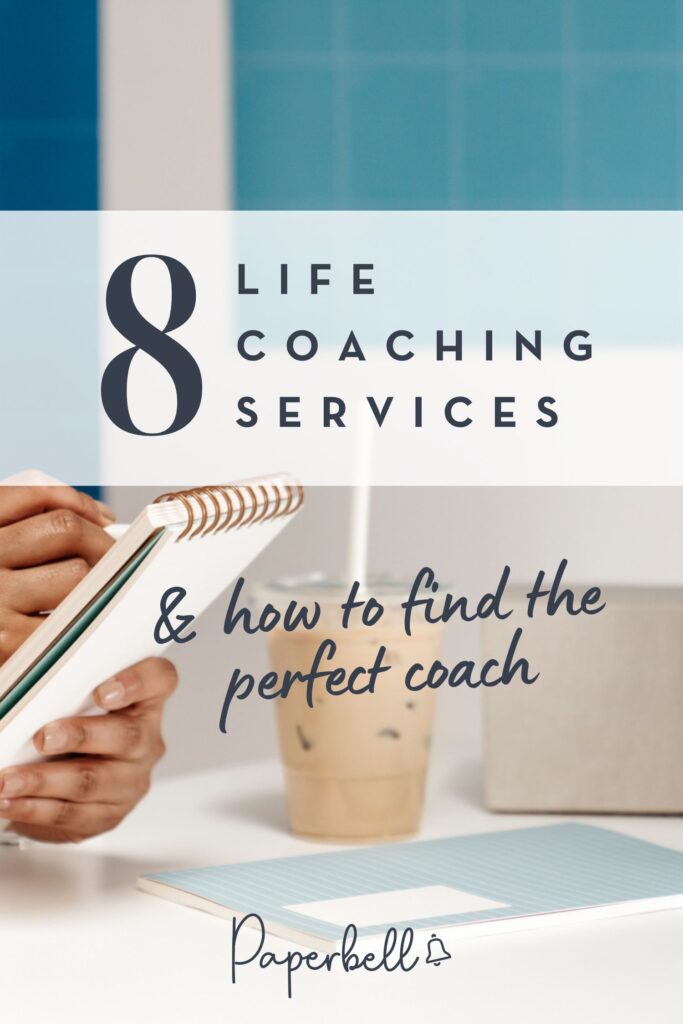When we’re struggling with our own issues, it can feel like no one understands exactly what we’re going through, not even our best friends and family.
That’s when it’s time to speak to a trained professional and benefit from personal coaching.
There’s a wide range of life coaching services today that you can choose from—from health and wellness to business and relationships. Let’s explore these coaching specialties and how you can find the perfect professional for your needs.
What Are Life Coaching Services?
A life coach is a person who can help you progress in various aspects of your life. People who work with coaches can get support to improve their mindset, personal skills, relationships, career, and so on.
Typically, coaches receive some form of training or coaching themselves to become life coaches. There isn’t one universally accepted certification or standard, but several certifications exist to train life coaches. Here are just a few examples:
- Life Coach Institute
- Health Coach Institute
- Integrative Wellness Academy
- Internationally Accredited Training Center – NLP & Certified Life Coach Training
- International Coaching Federation
The right life coach can help you:
- Set and clarify the right goals for you
- Identify what’s holding you back from achieving those goals
- Create a plan of action to get through those obstacles
- Make the most of your unique skills
- Unlock your full potential
No matter where you are in life and where you’ve come from, there’s a coach out there who can help you overcome your current challenges.
Pro tip: Thinking of offering life coaching yourself? Paperbell makes it easy to get started by handling your website, scheduling, payments, contracts, and more—all in one place.
8 Types of Life Coaching Services

Services in this industry can vary wildly. Not all coaches have the same coaching style or specialty.
Here are eight of the most popular areas of coaching you can seek out.
1. Relationship Coaching
A relationship coach can help you improve your interpersonal communication skills and navigate your different types of relationships, from romantic to professional and everything in between.
There’s a common misconception that you only need a relationship coach if you have unhealthy bonds. In reality, there are always ways you can improve yourself and make the most of your current connections, or find new ones that align better with you.
This includes your significant other, your family members and relatives, your friends, your coworkers, your kids, and even yourself.
A real-life example of a relationship coach is Christopher Louis. He helps people uncover their personal barriers to love, learn how to read between the lines, and handle complex relationship issues with confidence.
2. Financial Coaching
A financial coach can guide you through any money-related issue. Whether you want to learn how to budget better or need guidance to plan for retirement, a professional coach can help you get there.
A financial coach can also help you reframe your mindset around money and learn how to make better financial decisions.
We often get stuck in repetitive patterns around earning, managing, and investing our money. A financial coach can help you uncover your blind spots and show you areas where you have room for growth. For example, they can help you create a realistic budget and savings plan to save for a home while managing daily expenses.
It’s the best investment you can make in yourself.
3. Business Coaching
Business coaching is ideal for anyone who has a business or wants to start a new one. Even experienced entrepreneurs need a coach to break through their limitations and take their businesses to the next level.
Coaches in this area provide a fresh perspective and point out new growth opportunities. They help entrepreneurs plan better and become more confident leaders.
Business owners must also acquire specialized skills like building a website, marketing their services, and establishing strong client relationships. These are all areas that a business coach can help with.
A real-life example of a business coach is Cristin Downs. She helps professionals change careers, rebound from a layoff, start a business, and align it with their values.
4. Personal Development Coaching
Personal development coaching covers a wide range of topics. Here are some examples:
- Learning better time management
- Becoming more empathetic
- Overcoming fear or procrastination
- Gaining confidence
- Letting go of the past
You might come across personal development coaches by many different names, including lifestyle coaches or empowerment coaches. The best way to learn about their personal approach is to ask them during a discovery session.
An example of personal development coaching would be helping a professional overcome procrastination through better time management and a more disciplined routine.
5. Health and Wellness Coaching

Health and wellness coaches focus on physical, mental, and emotional health. They can guide you to:
- Implement healthier eating habits
- Develop and stick to an exercise regimen
- Improve your mindset related to your health
- Become more mindful of any unhealthy habits
- Overcome stress and anxiety
- Manage chronic illnesses
Nothing is more important than our health, yet it’s an area many of us neglect.
Whether you want to get into shape or improve your overall vitality, working with a health coach can help you achieve lasting change and might even add years to your life.
A real-life example of a health coach is Tasha Cook. She helps women over 40 navigate the challenges of perimenopause and menopause and improve their overall well-being.
6. Recovery Coaching
It can be difficult and lonely to overcome addiction on your own. Support groups can help, but some people need a more individual approach.
Recovery coaches support people through overcoming addiction and trauma, as well as the life transition that comes with it. They provide ongoing support to clients struggling with anything, from technology addiction and gambling to substance abuse.
These coaches also put great emphasis on educating people on the mental health issues that led them to addiction to avoid it in the future. Part of their process is to prevent relapse and achieve a lasting change in their clients’ lives.
An example of recovery coaching would be helping someone rebuild their life after substance abuse and preventing them from relapsing through ongoing support.
7. Career Coaching
Unlike business coaches, career coaches focus on your career advancement or changing fields. They can also help you develop valuable skills in your industry so that you can have an edge in the market.
A career coach can support you with:
- Helping you discover what your career goals are
- Getting better at interviews
- Understanding the job market
- Creating an effective resume
- Transitioning to a new field at any age
Our careers aren’t just about making money. We spend the majority of our waking hours at work and it’s one of the biggest influences on our life satisfaction and fulfillment. A career coach can help you find the type of work that’s most meaningful to you and explore ways you can monetize it.
A real-life example of a career coach is Olga Volgin. She helps high-achieving professionals optimize their time, energy, and focus with productivity tools and strategies for greater balance.
8. Transitional Coaching
Transitional coaching helps you get through big life changes. Some examples of these transitions include:
- Moving to a new city, state, or country
- Starting a new career or making an important career change
- Graduating college (or going back to college)
- Becoming a parent
- Going through a divorce
- Kids leaving the nest
- Losing a loved one
These changes can be overwhelming to go through alone. A transition coach can help you put things in perspective and give you the necessary tools to navigate them. They can also provide emotional support and teach you how to incorporate self-care routines into your everyday life.
When you look back, you’ll see how these tools helped you process difficult emotions, make the right decisions, and get to a better place in life. You’ll become more resilient and ready to take on new challenges.
An example of transitional coaching would be a mother adjusting to an empty nest by rediscovering her passions and creating a fulfilling new chapter in her life.
How to Know Which Life Coaching Services You Need
With so many life coaching services available, how do you know which one you need?
Here are some questions you can ask yourself to decide:
- Transitional coach: Are you facing any important transitions in your life, such as a new relationship, a divorce, a new career, or a cross-country move? Consider looking for a transitional coach.
- Career coach: How fulfilling is your career? Are you making the most of it? If you feel uncertain or unsatisfied with any aspect of your work, look for a career coach.
- Relationship coach: Take a look at your relationships. Do they bring you joy, or do they drain you? If the latter, a relationship coach could help you out.
- Business coach: Do you have a business? Where do you want to take it? Do you feel stuck or need help moving past your current stage? A business coach can help you overcome these hurdles and maximize your potential.
- Financial coach: Are you living paycheck to paycheck? Do you always feel your money is disappearing faster than you can count? Look for a financial coach to build a better relationship with money.
- Recovery coach: Do you struggle with addiction? A recovery coach can help you overcome it for good.
- Health and wellness coach: Do you want to develop healthier habits? Are you struggling with low energy level, your weight, or managing your emotions? A health and wellness coach can help you create lasting change.
- Personal development coach: Do you want to consciously create a life you thrive in and become your best self? Look for a personal development coach.
How to Find Life Coaching Services Online
Here are a few ways you can find the perfect professional for you.
Follow Coaches on Social Media
One of the best ways to understand what a life coach can offer is to follow them on social media. For example, you can search on Instagram for the type of life coach you’re looking for, read their bios, and follow the ones you feel you’d get along with.
Look at their stories and read what they post. Watch any videos they may publish. This will allow you to understand more about their life coaching philosophy.
You can also get a feel for how they speak and show up for their audience.
Look at Testimonials
Reading testimonials about a coach will give you an idea of what other clients have experienced working with them. You may find them in their Instagram highlights, on their website, or in their downloadable materials.
Look for reviews that go beyond generic compliments and describe the coach’s approach and strengths more specifically.
Use a Life Coach Directory
Another way to find a life coach is to search through directories. These listing sites help you search for the exact professional you need.
Directories allow you to filter for coaching specialties and even target audiences, like a financial coach for millennials. Check out CoachCompare for a wide variety of online life coaches to hire.
FAQ
What Are Some Examples of Life Coaching Services?
Some examples of what life coaching services may involve are goal-setting, accountability, mindset coaching, confidence building, and habit changes.
Which Life Coaching Service Should I Offer?
Offer services based on your expertise and your ideal client’s biggest challenges. Start with what you’re best at and tailor your niche as you grow.
It’s Time to Unlock Your Potential
Finding the right life coach can be transformative, helping you navigate challenges and unlock your full potential in various aspects of life. With so many specialties available, there’s a coach suited to everyone’s unique needs.
And if you got inspired to become a coach yourself, there’s no easier way to set up and manage your practice than with Paperbell.
It’s an all-in-one website and client management tool that handles your payments, contracts, scheduling, and client information. You can try all features on Paperbell with a free account.

Editor’s Note: This post was originally published in October 2021 and has since been updated for accuracy.









